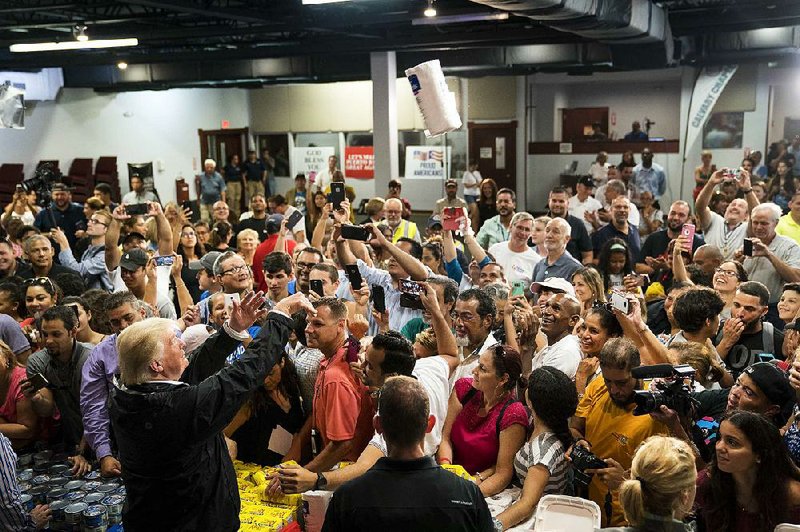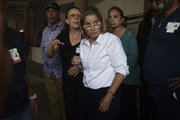President Donald Trump on Thursday falsely accused Democrats of inflating the death toll from Hurricane Maria in Puerto Rico last year, rejecting that government's assessment that the storm had claimed nearly 3,000 lives.
Trump said in a Twitter post that the toll was only six to 18 dead after his visit after the storm but that was at a time when the estimate of fatalities was changing. It rose to 34 in the hours after the president left the island. Trump said Thursday that Democrats padded the death toll by including, for example, a person who died of old age.
"3000 people did not die in the two hurricanes that hit Puerto Rico. When I left the Island, AFTER the storm had hit, they had anywhere from 6 to 18 deaths. As time went by it did not go up by much. Then, a long time later, they started to report really large numbers, like 3000," Trump wrote.
He continued, "This was done by the Democrats in order to make me look as bad as possible when I was successfully raising Billions of Dollars to help rebuild Puerto Rico. If a person died for any reason, like old age, just add them onto the list. Bad politics. I love Puerto Rico!"
The president's comments came as the government prepared for Hurricane Florence, whose high winds were already beginning to batter the coast of the Carolinas.
Puerto Rico's leadership and several leading Republicans in Congress took issue with the president disputing the estimated number of deaths on the island tied to Hurricane Maria.
"We strongly denounce anyone who would use this disaster or question our suffering for political purposes," said Gov. Ricardo Rosello. "I ask the president to recognize the magnitude of Hurricane Maria and continue working with my government to ensure a full recovery of the American citizens of Puerto Rico. We cannot allow the devastation of our citizens to be questioned and we cannot allow response efforts to be politicized."
San Juan Mayor Carmen Yulin Cruz, who publicly pleaded with Trump for a stronger response to the storm, also blasted the president.
"President Trump's statement, questioning the deaths in Puerto Rico, shows a lack of respect for our reality and our pain," she said in a statement. "He simply is unable to grasp the human suffering that his neglect and lack of sensibility have caused us. 3000 people died on his watch and his inability to grasp that makes him dangerous."
During a news conference on Capitol Hill on Thursday morning, House Speaker Paul Ryan, R-Wis., avoided directly criticizing Trump but said he had no reason to dispute the study's findings.
"This was a function of a devastating storm hitting an isolated island, and that is really no one's fault," Ryan said. "The casualties mounted for a long time, and I have no reason to dispute those numbers."
Rep. Ileana Ros-Lehtinen, a retiring Miami Republican, said that no one should distort the truth of what happened in Puerto Rico. "It might be a new low," Ros-Lehtinen said of the president's false claim.
The death toll in Puerto Rico has changed since Trump's visit to the island last year. Fatalities from the storm had been officially recorded as 64 for nearly a year, despite convincing evidence that the figure was too low because official death certificates had failed to take into account the long-range impact of the storm.
In August, after a thorough review by George Washington University researchers, Puerto Rican officials accepted a revised estimate of the dead as 2,975.
The study looked at the number of deaths from September 2017 to February 2018 and compared that total with what would have been expected based on historical patterns. Researchers factored in many variables, including the departure of hundreds of thousands of island residents in the aftermath of Maria.
The analysis showed that the mortality rate spiked in the months after the storm, particularly in the poorest areas of Puerto Rico, and among elderly men.
The unusually high death rate never completely reached the normal level even after six months, the researchers found -- a sign of Puerto Rico's continued struggle to deal with the effects of the hurricane.
Lawmakers -- Republican and Democrat -- have accepted the study's findings.
"These days even tragedy becomes political," Sen. Marco Rubio, R-Fla., said in a Twitter post Thursday. Rubio said 3,000 Americans died in Puerto Rico after the hurricane and said federal and local governments both made mistakes.
Since the storm, many Puerto Ricans have relocated to Florida and are eligible to vote in the midterm elections, making support from the Puerto Rican diaspora even more critical in the state that is known for close races.
Gov. Rick Scott of Florida, a Republican who is running for the U.S. Senate against a longtime Democratic incumbent, disputed the president's assertions in a Twitter post Thursday.
"I disagree with @POTUS- an independent study said thousands were lost and Gov. Rossello agreed," Scott wrote. "I've been to Puerto Rico 7 times & saw devastation firsthand. The loss of any life is tragic; the extent of lives lost as a result of Maria is heart wrenching. I'll continue to help PR."
The White House defended the president.
"As the President said, every death from Hurricane Maria is a horror. Before, during, and after the two massive hurricanes, the President directed the entire Administration to provide unprecedented support to Puerto Rico," said White House spokesman Hogan Gidley in a statement. "President Trump was responding to the liberal media and the San Juan Mayor who sadly, have tried to exploit the devastation by pushing out a constant stream of misinformation and false accusations."
Trump took to Twitter this week to warn residents in the path of Hurricane Florence to follow the advice of local officials and to be prepared. He also repeated his assessment that his team got high marks for the responses to hurricanes in 2017.
Trump has pushed back against criticism that his administration was slow to respond to Puerto Rico, where the distribution of supplies, gas and food lagged and power failures lasted for months, particularly compared with a swift response to an earlier hurricane, Harvey, that hit Texas. It was six days after Hurricane Maria hit the island before Trump pledged to go there, even as he traveled to Texas four days after Hurricane Harvey made landfall.
In July, the Federal Emergency Management Agency published a report, noting empty warehouses and not enough qualified workers in position to respond to the disaster. It did not include a fatality count, citing an ongoing review by the Puerto Rican government.
While Trump on Thursday accused the Democrats of "bad politics," Democratic lawmakers seized on the president's portrayal of the loss of life in Puerto Rico.
"You're right, Mr. President. The Hurricane didn't kill 3,000 people. Your botched response did," Sen. Robert Menendez, D-N.J., said in a Twitter post.
The House Democratic leader, Nancy Pelosi, of California, said in a tweet that the president "prefers his 'alternative facts' to the tragedy faced by families of the lost."
Rep. Bennie Thompson, D-Miss., called for the president to resign.
"The fact that the President will not take responsibility for his administration's failures and will not even recognize that thousands have perished shows us, once again, that he is not fit to serve as our president," Thompson said in a statement.
Information for this article was contributed by Eileen Sullivan, Julie Hirschfeld Davis and Nicholas Fandos of The New York Times; by John Wagner, Joel Achenbach, Mike Debonis and Sueng Min Kim of The Washington Post; and by Catherine Lucey, Zeke Miller and Jonathan Lemire of The Associated Press.
A Section on 09/14/2018

